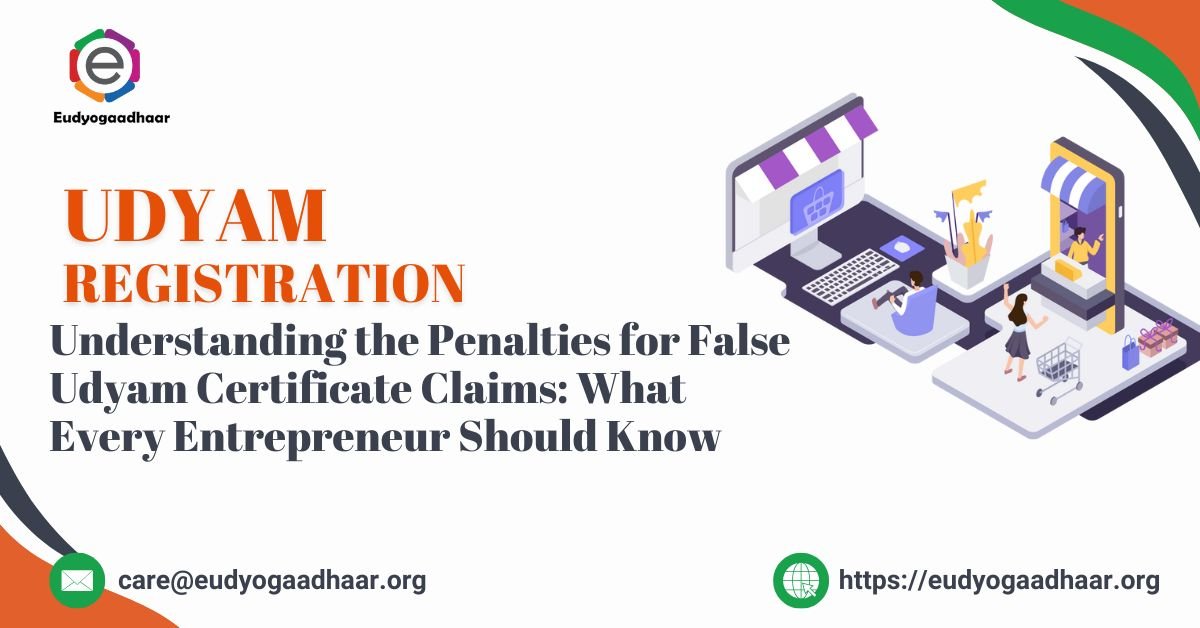Understanding the Penalties for False Udyam Certificate Claims: What Every Entrepreneur Should Know
The Udyam Registration Certificate is a vital document for Micro, Small, and Medium Enterprises (MSMEs) in India. Introduced by the Ministry of Micro, Small, and Medium Enterprises in July 2020, it serves as an official government recognition of a business’s status as an MSME. The Udyam Certificate offers businesses various benefits such as easier access to loans, tax exemptions, and eligibility for government schemes. However, some entrepreneurs may attempt to manipulate the system by providing false information during the registration process. Making false claims during the Udyam registration can lead to serious legal consequences.
In this article, we will explore the penalties associated with submitting false claims to obtain a Udyam Certificate, how the government verifies applications, and how businesses can ensure compliance with the rules.
What Constitutes a False Claim?
Before diving into the penalties, it’s essential to understand what constitutes a false claim in the context of Udyam Registration. Here are some common examples of misleading or false information that entrepreneurs might provide during registration:
- Misrepresenting the Size of the Business: Providing inaccurate information about your business’s investment in plant and machinery or equipment or falsely reporting the turnover to qualify for MSME status.
- Incorrect Classification: Register as a micro, small, or medium enterprise when your business does not meet the criteria for these categories.
- Falsifying Ownership Information: Providing inaccurate or misleading information about the ownership of the business, such as falsely claiming that the enterprise is owned by a woman or a member of a minority group to gain additional benefits.
- Submitting False Documents: Submitting fraudulent documents such as fake identity proof, incorrect business details, or false turnover reports to manipulate the registration outcome.
Government’s Mechanism for Verifying Udyam Certificate Claims
The government has implemented various mechanisms to verify the authenticity of the information provided during Udyam registration. The primary verification occurs through cross-checking with the Income Tax Department and GST databases. The Udyam Registration portal automatically pulls information related to the applicant’s business based on their PAN and GST numbers.
Additionally, the government may conduct physical inspections and audits of businesses if there are suspicions of fraud. This may involve verifying the business’s investment in plant and machinery, turnover, and other factors to confirm that the company is accurately classified as an MSME.
If the authorities detect inconsistencies in the information submitted, the business may be flagged for further investigation, potentially leading to legal action.
Penalties for False Udyam Certificate Claims
Providing false information to obtain a Udyam Certificate can lead to several penalties, ranging from fines to criminal prosecution. Here are the potential consequences of making false claims:
- Cancellation of Udyam Certificate
If a business is found to have made false claims during the registration process, the first penalty is typically the cancellation of the Udyam Certificate. Once the certificate is canceled, the business will no longer be eligible for the benefits and schemes designed for MSMEs, such as lower interest rates on loans, subsidies, and tax exemptions. Additionally, the business might be blacklisted from applying for Udyam registration in the future. - Monetary Penalties and Fines
Misrepresentation of facts during Udyam registration can result in monetary penalties. While the specific amount may vary depending on the severity of the offense and the level of misrepresentation, fines can be substantial, especially if the false information has been used to access government subsidies or tax benefits. The company may be required to repay any financial assistance it received based on the fraudulent certificate. - Criminal Prosecution
In severe cases, providing false information to obtain a Udyam Certificate can lead to criminal prosecution under various provisions of Indian law, such as the Indian Penal Code (IPC) for forgery or fraud. Business owners may face imprisonment if the false claims are significant, especially if they involve large-scale financial gains or defrauding government schemes. - Repayment of Financial Benefits
If a business has received financial benefits or subsidies through false Udyam registration, the government can demand the repayment of these benefits. For example, if a company received a lower-interest loan under an MSME scheme but was later found ineligible due to false claims, the full amount of the benefit may be demanded with interest and fines.
- Impact on Business Reputation
Beyond legal and financial penalties, businesses found guilty of submitting false claims may suffer severe reputational damage. Being caught in fraudulent activities can destroy a company’s reputation, leading to a loss of trust among clients, suppliers, and financial institutions. It can also hinder the company’s ability to secure future business deals or loans, as potential partners may be hesitant to work with a company involved in fraudulent activities.
How to Avoid False Claims and Ensure Compliance
Given the severe penalties for false Udyam certificate claims, business owners must ensure their registration process is accurate and compliant with government regulations. Here are some tips to avoid making false claims and protect your business:
- Understand MSME Criteria Clearly
Before applying for Udyam registration, ensure that you fully understand the criteria for micro, small, and medium enterprises. Familiarize yourself with the investment and turnover limits for each category and check if your business falls within the eligible range. - Provide Accurate Financial Information
Always provide accurate financial information during the registration process, especially regarding your business’s investment and turnover. Double-check your financial records and use audited financial statements to ensure accuracy. - Submit Genuine Documents
Make sure that all the documents submitted during registration, such as Aadhaar, PAN, and GST details, are genuine and up to date. Fraudulent documents can lead to severe legal consequences, so it’s important to verify them beforehand. - Consult with Experts if Needed
If you’re unsure about any part of the Udyam registration process, consider consulting with legal or financial experts who specialize in MSME registration. They can guide you through the process and help ensure that your registration is compliant with the law. - Monitor Compliance After Registration
After obtaining the Udyam certificate, it’s essential to continue complying with the MSME criteria. If your business grows and no longer qualifies as an MSME, you must update your Udyam registration to reflect the current size of your enterprise.
Note: Click here to re-register your Udyam certificate now – Udyam Re-registration
Conclusion
Obtaining a Udyam Certificate is a significant advantage for MSMEs, offering access to numerous benefits. However, attempting to acquire this certification through false claims can have serious legal and financial repercussions. Penalties for false Udyam certificate claims include cancellation of the certificate, monetary fines, criminal prosecution, and reputational damage. To avoid these risks, businesses must ensure that all information provided during registration is accurate and compliant with MSME guidelines. By doing so, entrepreneurs can protect their businesses while enjoying the full benefits of Udyam registration.






